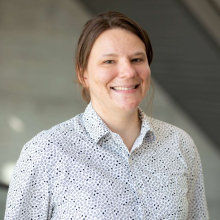CBE 298: Cell-Free Systems for Studying and Engineering Protein Assemblies

Abstract: Protein assemblies play an important role in many biological processes and constitute a unique class of building blocks for materials of various types, owing to our ability to precisely tune their sequence. Our ability to harness these assemblies in and beyond biological contexts is contingent on understanding the driving forces for their formation. However, production and study of these assembling proteins typically depends on intracellular protein production followed by lysis and soluble protein purification —steps that are not necessarily compatible with maintaining the integrity of the protein assemblies of interest. Cell-free protein synthesis (CFPS) offers the opportunity to shift this paradigm for protein assemblies, providing on-demand synthesis of protein assemblies in an unconstrained open reaction environment. In this talk, I will describe how we are using CFPS in the study of two different types of protein assemblies.
First, I will demonstrate how we used CFPS to study and prototype assemblies formed by hexameric bacterial microcompartment (BMC-H) proteins that drive the formation of bacterial microcompartments. This work focuses on two homologous BMC-H proteins that come from the same bacterial microcompartment system, PduA and PduJ. Using immunostaining and confocal fluorescence microscopy, we find that both PduA and PduJ form structures hundreds of microns large in CFPS, highlighting the role that the cell boundary plays in checking protein self-assembly in vivo. Further, we find that while PduA and PduJ are similar in both biological function and sequence, these two proteins form significantly different supramolecular structures in CFPS, a testament to the significant impact seemingly small differences can have on self-assembly — a finding that is further supported by characterization of single PduA and PduJ point mutants.
The second portion of my talk will focus on applying CFPS to the study of proteins that form bacterial biomolecular condensates. Specifically, using a panel of model condensate forming proteins, we are studying how condensate behavior varies across in vitro buffer systems, in vivo bacterial systems, and in vitro CFPS systems, with the ultimate goal of addressing the limitations of current in vitro and in vivo approaches through the use of CFPS.
Bio: Carolyn Mills (she/they) is an assistant professor in the Department of Bioengineering at UC Santa Barbara (UCSB). Her research at UCSB focuses on molecular engineering of proteins that control spatial organization in biological systems, with applications in plastic remediation and oral vaccine delivery. Mills completed her bachelor's degree in chemical engineering in 2013 at UCSB, and her doctorate in chemical engineering in 2019 at Massachusetts Institute of Technology, working in Professor Bradley Olsen’s lab on self-assembly and high-throughput processing of fusion protein materials. During her Ph.D., Mills was supported by an NSF Graduate Research Fellowship. She completed her postdoctoral work with Professor Danielle Tullman-Ercek at Northwestern University, researching self-assembling protein nanoreactors. During her time at Northwestern, Mills was recognized by the Chemical and Biological Engineering Department’s Distinguished Postdoctoral Service Award. At UCSB, Mills is actively involved in collaborations at both the NSF ExFAB Biofoundry and BioPACIFIC Materials Innovation Platform.
Share
Related Content
| Attachment | Size |
|---|---|
| 875.5 KB |
Upcoming Events
-
CEE Ph.D. Defense Announcement: Breaking New Ground - Excavation Performance in Tar-Infused and Conventional Soils for LA Metro D-Line Extension Project
-
MSE 298 Seminar: Tunable Optical Metasurfaces And Zero-Index Materials
-
EECS Seminar: Terahertz metasurface quantum-cascade vertical-external-cavity surface-emitting-lasers (VECSELs)
-
EECS Seminar: AI-Driven Design Automation for Multi-Chip Integration in AI Chips
-
CBE 298: Cell-Free Systems for Studying and Engineering Protein Assemblies
